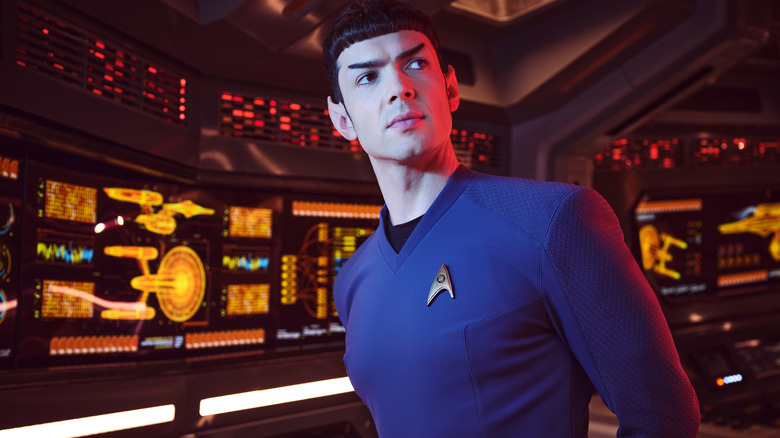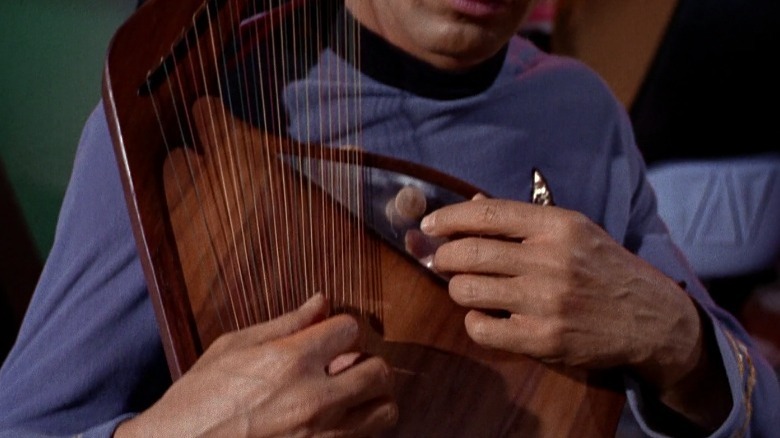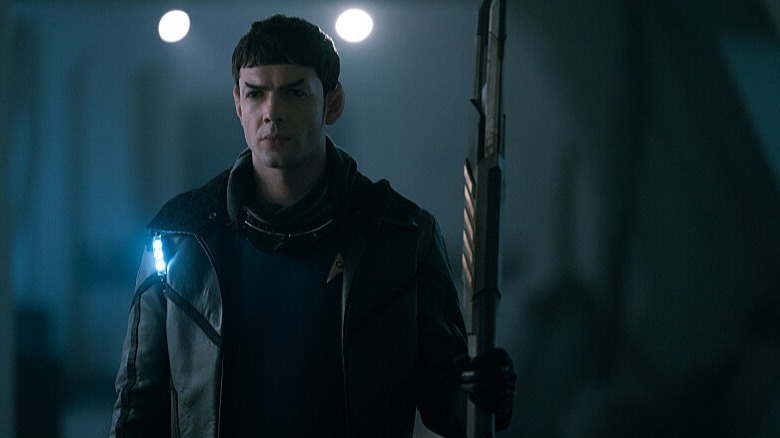The Emotionally Unstable Spock Of Star Trek: Strange New Worlds Is A Freaking Delight
This post contains spoilers for the season premiere of "Star Trek: Strange New Worlds."
Within seconds of telling us that Captain Pike (Anson Mount) would be leaving substitute second-in-command Spock (Ethan Peck) in charge for a few days, the season premiere of "Star Trek: Strange New Worlds" did the funniest thing possible by cutting to a scene of Spock checking in at the med bay. Spock has some unusual symptoms that nonetheless probably sound extremely usual to viewers at home. "Increased heart rate, heightened pain in the neck, jaw, and lower back..." Dr. M'benga (Babs Olusanmokun) relays back to the half-Vulcan crew member, along with a diagnosis: "If I didn't know better, I'd say you were experiencing what we humans call stress." He's just like us!
It may seem counterintuitive to start the new season of the show with Spock in charge and Pike oddly out of the picture, but it's actually in keeping with one of the "Star Trek" franchise's greatest strengths: showing off Spock's human side. The series premiere doesn't have too much fun at the Vulcan's expense (if his problem persists as the season wears on, I hope we get to see moody Spock, horny Spock, and every other variation possible), but it does give us a glimpse of what Peck's version of the character looks like when he feels a little bit out of control. Lucky for us, it turns out that what he looks like is adorably overwhelmed.
Diagnosis: too many feelings. Prescription: strum a lute
M'benga ends up diagnosing Spock with a sort of un-repressed humanness, telling him that when he raged out while fighting the Gorn last season he accidentally removed the "cognitive blocks" that Vulcans use to keep their emotions in check. "Now all your emotions are flowing more freely," he tells Spock, concluding, "You'll just have to learn to live with it, like we all do." His prescription is just as delightful as his diagnosis: M'benga gives Spock a funky-looking string instrument (actually a Vulcan lute called a Ka'athyra) and tells him to channel his emotions into music. Side note: everyone, let's take a minute here to pray to the silly TV gods that this means we'll eventually get a moody Spock ballad performance, a la Giles singing "Behind Blue Eyes" on "Buffy the Vampire Slayer." Done? Okay, moving on.
Spock's human emotions don't manifest much throughout the episode until its ending when he thinks his bestie (and maybe crush) Nurse Chapel (Jess Bush) is dead. We already know there's something brewing between the two because he had his heart monitor on when she walked in earlier, and it skyrocketed at the sight of her. This perhaps contributes to his emotional response when Chapel is in grave danger. "You don't die. You do not die!" he says, giving her chest compressions. In this moment, as Spock tears up, he looks just like a little boy. Yes, the character is already the most beloved in all of Trek history, so it's easy to look at him showing his human side and get emotional along with him, but Peck's great performance here plays a big part too.
Our sweet un-Vulcan Vulcan
The premiere episode leaves us with the (again) low-key hilarious sight of Spock strumming his doctor-prescribed lute, but before that, it gets pretty heartfelt. When Spock, sitting by Chapel's bedside, is told she'll be fine, he turns to show a tear on his cheek. "I'm not," he says. "I have no words for what I feel." It's enough to make us all want to wrap the poor, sweet alien man up in a hug, but luckily, Spock seems to be surrounded by people who would hug him if he wanted, including Carol Kane's eccentric, motherly Pelia. In a conversation about immortality, he worries about the loss of loved ones, and she utters what might be one of my favorite simple declarations in all of "Star Trek": "Oh, my sweet un-Vulcan Vulcan," she says, instantly understanding him as a person.
That's our Spock, and it's also a summary of what makes his more emotional side my favorite part of him (though /Film's Witney Seibold makes a compelling case for his Vulcan side being better). In a world that's built around the heart as well as the brain, Spock feels like an outsider for his logic-minded approach to the world. Longtime Trek fans know, though, that his Vulcan heart beats as strong as any human's, with or without his emotional blocks in place. It's lovely to see the walls come down in the season premiere because it feels like it brings Spock one step closer to the loyal and secretly loving man fans know: the one who is brave and thoughtful, and who against all odds serves as the beloved emotional center of the "Star Trek" world.
"Star Trek: Strange New Worlds" streams new episodes on Thursdays on Paramount+.


